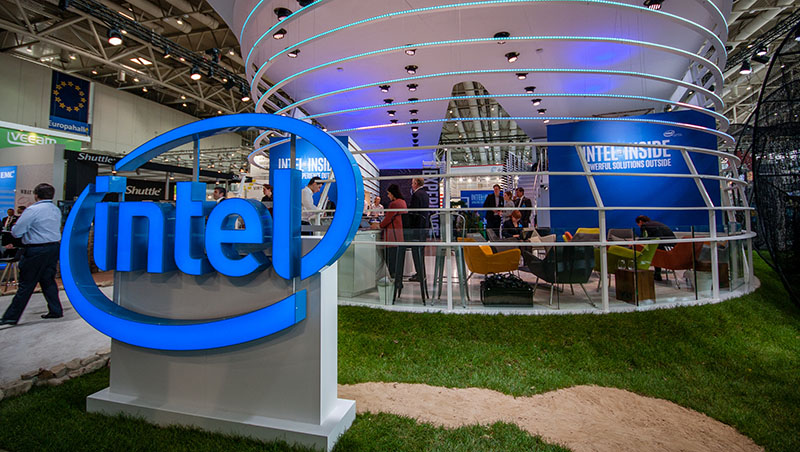Intel's data-centric services drive record 15% revenue growth in Q2 2018
Growth in Intel’s data-centric services, including IoT and data centre groups, approach 50% of its overall revenue


Intel declared a record 15% growth in revenue year-on-year in its 2018 second quarter financial results, with income driven predominately by its performance in data-centric services.
Revenue in the second quarter was $17 billion, with Intel's data-centric businesses - including the IoT group, the data centre group, programmable solutions group, and the memory group - growing between 18% and 27% - and 26% on average.
Intel's data-centric services now account for approaching 50% of the company's total revenue.
Although desktop-based sales fell by 1% year-on-year, PC-centric performance grew overall by 6%, with Intel raking in $8.7 billion overall, with notebook chip sales rising 9%. This growth reflecting recent news that global PC shipments grew for the first time since 2012.
After 14 quarters of consecutive decline, research-company Gartner recorded a 1.4% year-on-year rise in shipments in the second quarter of 2018, with analysts saying this was driven by demand in the business market, offsetting weaker consumer demand.
"After five decades in tech, Intel is poised to deliver our third record year in a row. We are uniquely positioned to capitalize on the need to process, store and move data, which has never been more pervasive or more valuable," said Bob Swan, Intel CFO and interim CEO.
The announcement represented Swan's first as interim CEO after its former chief Brian Krzanich stepped down following a 'workplace fling' earlier this year.
Get the ITPro daily newsletter
Sign up today and you will receive a free copy of our Future Focus 2025 report - the leading guidance on AI, cybersecurity and other IT challenges as per 700+ senior executives
"Intel is now competing for a $260 billion market opportunity, and our second quarter results show that we're winning. As a result of the continued strength we are seeing across the business, we are raising our full year revenue and earnings outlook."
Intel has attributed its own PC-centric growth to strong demand for its new generation of chips in both gaming and commercial spaces, particularly the 8th-generation Intel Core vPro processors for business, as well as the i9 processor built for high-performance laptops.
Data-centric growth, meanwhile, was driven by an array of factors including "strong demand from cloud and communications service providers investing to meet the explosive demand for data and to improve the performance of data-intensive workloads like Artificial Intelligence," according to the company.
Image: Bigstock

Keumars Afifi-Sabet is a writer and editor that specialises in public sector, cyber security, and cloud computing. He first joined ITPro as a staff writer in April 2018 and eventually became its Features Editor. Although a regular contributor to other tech sites in the past, these days you will find Keumars on LiveScience, where he runs its Technology section.
-
 Cleo attack victim list grows as Hertz confirms customer data stolen
Cleo attack victim list grows as Hertz confirms customer data stolenNews Hertz has confirmed it suffered a data breach as a result of the Cleo zero-day vulnerability in late 2024, with the car rental giant warning that customer data was stolen.
By Ross Kelly
-
 Lateral moves in tech: Why leaders should support employee mobility
Lateral moves in tech: Why leaders should support employee mobilityIn-depth Encouraging staff to switch roles can have long-term benefits for skills in the tech sector
By Keri Allan
-
 Better together
Better togetherWhitepaper Achieve more with Windows 11 and Surface
By ITPro
-
 Transforming the enterprise
Transforming the enterpriseWhitepaper With Intel and CDW
By ITPro
-
 The top trends in money remittance
The top trends in money remittanceWhitepaper Tackling the key issues shaping the money remittance industry
By ITPro
-
 How Kantar revamped its IT infrastructure after being sold off
How Kantar revamped its IT infrastructure after being sold offCase Study Being acquired by a private equity firm meant Kantar couldn’t rely on its parent company’s infrastructure, and was forced to confront its technical shortcomings
By Rene Millman
-
 Deutsche Bank wraps up Postbank IT integration after bug-laden migrations
Deutsche Bank wraps up Postbank IT integration after bug-laden migrationsNews The IT merger is expected to generate annual savings of €300 million by 2025
By Daniel Todd
-
 Analyzing the economic benefits of Dell Technologies with VMware Tanzu & Intel
Analyzing the economic benefits of Dell Technologies with VMware Tanzu & IntelWhitepaper ESG economic validation
By ITPro
-
 Defra needs £726 million to modernize pervasive legacy IT issues
Defra needs £726 million to modernize pervasive legacy IT issuesNews A significant portion of IT systems are reportedly still in extended support or are fully unsupported
By Ross Kelly
-
 Former TSB CIO fined £81,000 for botched IT migration
Former TSB CIO fined £81,000 for botched IT migrationNews It’s the first penalty imposed on an individual involved in the infamous migration project
By Ross Kelly